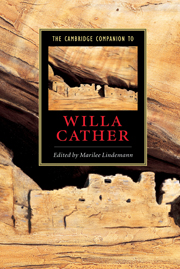Book contents
- Frontmatter
- Introduction
- Part I Contexts and critical issues
- 1 Willa Cather as progressive
- 2 The Cather thesis
- 3 Willa Cather’s American modernism
- 4 Willa Cather and the geography of Jewishness
- 5 Willa Cather and sexuality
- 6 Willa Cather and the performing arts
- 7 Willa Cather and the comic sense of self
- 8 Cather and the short story
- 9 Willa Cather in the country of the ill
- Part II Studies of major works
- Selected bibliography
- Index
3 - Willa Cather’s American modernism
from Part I - Contexts and critical issues
Published online by Cambridge University Press: 28 May 2006
- Frontmatter
- Introduction
- Part I Contexts and critical issues
- 1 Willa Cather as progressive
- 2 The Cather thesis
- 3 Willa Cather’s American modernism
- 4 Willa Cather and the geography of Jewishness
- 5 Willa Cather and sexuality
- 6 Willa Cather and the performing arts
- 7 Willa Cather and the comic sense of self
- 8 Cather and the short story
- 9 Willa Cather in the country of the ill
- Part II Studies of major works
- Selected bibliography
- Index
Summary
In the “Hired Girls” section of My Ántonia, just after her move to town, Ántonia tells the following story of country life. It is threshing time, and a tramp emerges from the intense heat, thirsty and looking for beer. Trading places with one of the men, he gets on the threshing machine, and begins to work: “He cut bands all right for a few minutes, and then, Mrs. Harling, he waved his hand to me and jumped head-first right into the threshing machine after the wheat. I begun to scream, and the men run to stop the horses, but the belt had sucked him down, and by the time they got her stopped, he was all beat and cut to pieces. He was wedged in so tight it was a hard job to get him out, and the machine ain't never worked right since.” In the dead tramp's pocket they find an old penknife, “the wish-bone of a chicken wrapped up in a piece of paper, and some poetry” - “The Old Oaken Bucket,” cut out of a newspaper. One glimpses in this arresting moment some of the distinctive interests and attitudes of Cather's fiction: its emphasis on the making of meaning, on the gestures, like the tramp's wave, that produce significance in a world cut loose from overmastering explanatory narratives; its careful attention to ordinary life and work as the field in which such meanings emerge; its tolerance for the inconclusive, suggested by the resonant inconsequence of the contents of the tramp's pockets.
- Type
- Chapter
- Information
- The Cambridge Companion to Willa Cather , pp. 51 - 65Publisher: Cambridge University PressPrint publication year: 2005
- 4
- Cited by



